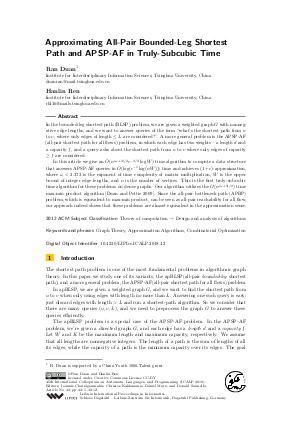Approximating All-Pair Bounded-Leg Shortest Path and APSP-AF in Truly-Subcubic Time
Authors Ran Duan, Hanlin Ren
-
Part of:
Volume:
45th International Colloquium on Automata, Languages, and Programming (ICALP 2018)
Part of: Series: Leibniz International Proceedings in Informatics (LIPIcs)
Part of: Conference: International Colloquium on Automata, Languages, and Programming (ICALP) - License:
 Creative Commons Attribution 3.0 Unported license
Creative Commons Attribution 3.0 Unported license
- Publication Date: 2018-07-04
File

PDF
LIPIcs.ICALP.2018.42.pdf
- Filesize: 458 kB
- 12 pages
Document Identifiers
Subject Classification
ACM Subject Classification
- Theory of computation → Design and analysis of algorithms
Keywords
- Graph Theory
- Approximation Algorithms
- Combinatorial Optimization
Metrics
- Access Statistics
-
Total Accesses (updated on a weekly basis)
0Document
0Metadata
Abstract
In the bounded-leg shortest path (BLSP) problem, we are given a weighted graph G with nonnegative edge lengths, and we want to answer queries of the form "what's the shortest path from u to v, where only edges of length <=L are considered?". A more general problem is the APSP-AF (all-pair shortest path for all flows) problem, in which each edge has two weights - a length d and a capacity f, and a query asks about the shortest path from u to v where only edges of capacity >= f are considered.
In this article we give an O~(n^{(omega+3)/2}epsilon^{-3/2}log W) time algorithm to compute a data structure that answers APSP-AF queries in O(log(epsilon^{-1}log (nW))) time and achieves (1+epsilon)-approximation, where omega < 2.373 is the exponent of time complexity of matrix multiplication, W is the upper bound of integer edge lengths, and n is the number of vertices. This is the first truly-subcubic time algorithm for these problems on dense graphs. Our algorithm utilizes the O(n^{(omega+3)/2}) time max-min product algorithm [Duan and Pettie 2009]. Since the all-pair bottleneck path (APBP) problem, which is equivalent to max-min product, can be seen as all-pair reachability for all flow, our approach indeed shows that these problems are almost equivalent in the approximation sense.
Cite As Get BibTex
Ran Duan and Hanlin Ren. Approximating All-Pair Bounded-Leg Shortest Path and APSP-AF in Truly-Subcubic Time. In 45th International Colloquium on Automata, Languages, and Programming (ICALP 2018). Leibniz International Proceedings in Informatics (LIPIcs), Volume 107, pp. 42:1-42:12, Schloss Dagstuhl – Leibniz-Zentrum für Informatik (2018)
https://doi.org/10.4230/LIPIcs.ICALP.2018.42
BibTex
@InProceedings{duan_et_al:LIPIcs.ICALP.2018.42,
author = {Duan, Ran and Ren, Hanlin},
title = {{Approximating All-Pair Bounded-Leg Shortest Path and APSP-AF in Truly-Subcubic Time}},
booktitle = {45th International Colloquium on Automata, Languages, and Programming (ICALP 2018)},
pages = {42:1--42:12},
series = {Leibniz International Proceedings in Informatics (LIPIcs)},
ISBN = {978-3-95977-076-7},
ISSN = {1868-8969},
year = {2018},
volume = {107},
editor = {Chatzigiannakis, Ioannis and Kaklamanis, Christos and Marx, D\'{a}niel and Sannella, Donald},
publisher = {Schloss Dagstuhl -- Leibniz-Zentrum f{\"u}r Informatik},
address = {Dagstuhl, Germany},
URL = {https://drops.dagstuhl.de/entities/document/10.4230/LIPIcs.ICALP.2018.42},
URN = {urn:nbn:de:0030-drops-90467},
doi = {10.4230/LIPIcs.ICALP.2018.42},
annote = {Keywords: Graph Theory, Approximation Algorithms, Combinatorial Optimization}
}
Author Details
Funding
- Duan, Ran: R. Duan is supported by a China Youth 1000-Talent grant.
References
-
Giorgio Ausiello, Giuseppe F Italiano, Alberto Marchetti Spaccamela, and Umberto Nanni. Incremental algorithms for minimal length paths. Journal of Algorithms, 12(4):615-638, 1991.

-
Surender Baswana, Ramesh Hariharan, and Sandeep Sen. Improved decremental algorithms for maintaining transitive closure and all-pairs shortest paths. Journal of Algorithms, 62(2):74-92, 2007.

-
Aaron Bernstein. Maintaining shortest paths under deletions in weighted directed graphs. SIAM Journal on Computing, 45(2):548-574, 2016.

-
Prosenjit Bose, Anil Maheshwari, Giri Narasimhan, Michiel Smid, and Norbert Zeh. Approximating geometric bottleneck shortest paths. Computational Geometry, 29(3):233-249, 2004.

-
Don Coppersmith and Shmuel Winograd. Matrix multiplication via arithmetic progressions. Journal of Symbolic Computation, 9(3):251-280, 1990.

-
Camil Demetrescu and Giuseppe F Italiano. Dynamic shortest paths and transitive closure: Algorithmic techniques and data structures. Journal of Discrete Algorithms, 4(3):353-383, 2006.

-
Ran Duan and Seth Pettie. Bounded-leg distance and reachability oracles. In Proceedings of the nineteenth annual ACM-SIAM symposium on Discrete algorithms, pages 436-445. Society for Industrial and Applied Mathematics, 2008.

-
Ran Duan and Seth Pettie. Fast algorithms for (max, min)-matrix multiplication and bottleneck shortest paths. In Twentieth Acm-Siam Symposium on Discrete Algorithms, SODA 2009, New York, Ny, Usa, January, pages 384-391, 2009.

-
Monika Henzinger, Sebastian Krinninger, Danupon Nanongkai, and Thatchaphol Saranurak. Unifying and strengthening hardness for dynamic problems via the online matrix-vector multiplication conjecture. In Proceedings of the forty-seventh annual ACM symposium on Theory of computing, pages 21-30. ACM, 2015.

-
Daniel P Martin. Dynamic shortest path and transitive closure algorithms: A survey. arXiv preprint arXiv:1709.00553, 2017.

-
Liam Roditty and Michael Segal. On bounded leg shortest paths problems. In Proceedings of the eighteenth annual ACM-SIAM symposium on Discrete algorithms, pages 775-784. Society for Industrial and Applied Mathematics, 2007.

-
Tong-Wook Shinn and Tadao Takaoka. Efficient graph algorithms for network analysis. In First International Conference on Resource Efficiency in Interorganizational Networks-ResEff 2013, page 236, 2013.

-
Tong-Wook Shinn and Tadao Takaoka. Combining all pairs shortest paths and all pairs bottleneck paths problems. In Latin American Symposium on Theoretical Informatics, pages 226-237. Springer, 2014.

-
Tong-Wook Shinn and Tadao Takaoka. Combining the shortest paths and the bottleneck paths problems. In Proceedings of the Thirty-Seventh Australasian Computer Science Conference-Volume 147, pages 13-18. Australian Computer Society, Inc., 2014.

-
Tong-Wook Shinn and Tadao Takaoka. Variations on the bottleneck paths problem. Theoretical Computer Science, 575:10-16, 2015. Special Issue on Algorithms and Computation.

-
Virginia Vassilevska, Ryan Williams, and Raphael Yuster. All-pairs bottleneck paths for general graphs in truly sub-cubic time. In Proceedings of the thirty-ninth annual ACM symposium on Theory of computing, pages 585-589. ACM, 2007.

-
Uri Zwick. All pairs shortest paths in weighted directed graphs - exact and almost exact algorithms. In Foundations of Computer Science, 1998. Proceedings. Symposium on, pages 310-319, 1998.

